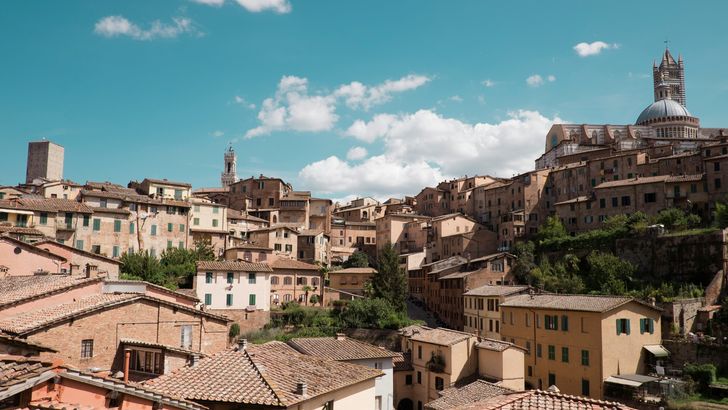This past summer I worked as a marketing intern at WAOW-TV 9*, a local news station in my hometown of Wausau, Wisconsin. Although I spent some time in the promotions and sales departments, most of my days played out at a desk in the newsroom, where I kept up with the station’s social media and overall online presence.
I engaged with viewers by responding to comments and complaints and helping to decide what to post, all the while trying (with everyone else at the station) to inform the public in the most truthful, unbiased manner possible. I wrote news stories, edited articles, scanned the wires for breaking updates, and built rapport with the rest of the Newsline 9 team. More than anything, I realized that I had never truly given news organizations the respect and understanding they deserve.
I had grown up watching Channel 9’s coverage, but I had never appreciated all of the work that went into preparing a newscast for my living room every night. It’s so easy to blame the media for almost all of our country’s problems—but they’re less at fault than a lot of people think (including myself before this experience).
I want to thank everyone at Newsline 9 who took me in from day one and made me feel like a friend as opposed to “the intern." I’m grateful for the real-world exposure, the relationships I built, and the things I was privileged enough to see.
Mostly, I’m honored to have worked for a company that taught me so many things. These are some of my biggest takeaways.
1. People will never be happy.
As a self-proclaimed textbook people pleaser, this was especially hard to swallow. I like to imagine that a world can exist where no one is offended, everyone listens to each other’s opinions, and Facebook comments don’t need to be moderated. Let me tell you that this is not the world we currently live in.
The comments we received on our social media were sometimes absolutely disgusting. Unfortunately images aren’t filtered for profanity automatically, and I once had to delete a picture of a penis someone posted (you read that right, male genitalia on a news station’s Facebook comments). In addition, there were countless creative ways people spelled swear words so that our filters would miss them. Preserving the PG nature of our online presence was sometimes a full-time job.
When I first arrived at the station, I didn’t understand why such a multitude of people became angry so quickly. To be fair I still don’t, but I’ve pinned it down to the fact that people will just never be happy. You can’t please everyone.
If you post a story that talks about negative reactions to Donald Trump, people will come up in arms because you’re clearly being liberal. If you post a story about the FBI deciding not to charge Hillary Clinton, it must mean that you personally, as a news organization, agree with their call. There’s truly no way to win.
In addition, if you post a major, nation-wide story, people will bleat that it’s not local news and wonder why you even bothered putting it up on the internet. If someone sends you a Facebook message with a news tip and you don’t have enough staff to cover their story that day, they’ll get angry and lose all tact as they threaten to take all their future news tips to your competition. If you quote someone and your viewers don’t agree with the quote, they will all forget that you’re not the ones who said it, your interviewee is. There are of course some exceptions to these scenarios, and by no means is everyone in our viewing area a rude person, but we definitely experience a lot of backlash for seemingly simple things.
For a while I found it immensely difficult to go into work everyday knowing I was serving viewers who only appeared to hate us. That’s what lead me to realize my next point…
2. The loudest voices don’t necessarily come from the majority.
When something pops up on your newsfeed or television screen and it doesn’t particularly bother you, chances are you’ll stay quiet about it. When something comes up that you absolutely despise, you’re much more likely to express your anger publicly.
This is the dilemma with our social media presence.
I learned over the three months I spent integrated with Newsline 9’s online persona that the loudest voices rarely come from the majority. There were times, of course, where almost every comment on a post was positive or almost every comment on a post was negative, and it seemed to accurately reflect our viewing area’s opinions as a whole, but those were rare occasions. Conflict was often prevalent in our comment sections as viewers argued among themselves and tried to argue with us.
I think in our society that we focus much more acutely on things that bother us than those that make us happy. When a story goes out about a wholesome fundraiser or abused animal that has found a new home, the response is generally positive, but also generally quite small. On the flip side, when we wrote a story about school administrators having an affair, the internet exploded with negative comments aimed in all sorts of directions.
It’s exhausting to deal with that sort of backlash day after day, let me tell you. We tried so hard to provide our community with the best news coverage possible (and of course we fell short, we’re only human) but it’s immensely disheartening when your viewers seem to become agitated at everything you post. It got to the point where I would recognize certain people by name due to the sheer volume of comments they sent our way.
At the end of the day I just had to remind myself that for every person sitting behind their computer screen typing out profane-laden complaints, there were likely a handful of others who just read our coverage and moved on, simply not moved enough to expend their energy on social media comments.
3. Reporters and anchors and producers are people too.
It’s easy to dehumanize public figures. When you see someone in the media, always poised and scripted, it’s natural to forget that they’re actually just a normal person going to work and doing their job. A television reporter works for a living just like anyone else you meet, and though part of their job might appear fun and laid-back (let’s be honest, hanging out on TV seems pretty cool), the endeavor as a whole is actually quite stressful.
The staff at a news station is not immune to natural human shortcomings. Though the job of informing the public is an important one, it’s also messy and difficult. News rooms are bustling, busy places full of bustling, busy people who have a million things to do at once. Think of how easy it is to make an honest mistake in your daily life… and then consider the pressure that a reporter/anchor/producer is under when they realize any mistake they make will be scrutinized by the public.
Misspelling or mispronouncing someone’s name wrong in a newscast becomes a horrible sin when the person’s family is offended. Messing up a single detail or forgetting to properly attribute a quote can result in accusations of unprofessionalism and even dishonesty. Of course, accuracy is absolutely vital in the news industry, and the backlash over large mistakes is understandable – but when even the smallest of transgressions can cause an army to come after you, it’s a little overwhelming (and ridiculous).
People in the news industry are just that: people. Flawed, dynamic, three-dimensional people. They are people who try their best to be good at their job and to bring truth into the world. They are people who come to work everyday with their own baggage and bias who have to find a way to distance their emotions from the sometimes heart-wrenching stories they must tell. They are not perfect, and they shouldn’t have to be. No matter how hard we try, none of us will ever go through life without screwing up somehow. I ask you to try to extend the same level of understanding you have for your friends to the strangers you see on TV, too. You never know what someone else is going through.
In my time at Newsline 9 I saw a group of talented, hardworking individuals putting everything they had into their job. They faced crazy and sometimes unpredictable hours, overcame a myriad of obstacles to cover each story, and most importantly, they did their best. When they messed up it came from a place of honesty and good intentions. Rare exceptions aside, I can tell you that the vast majority of people in the news industry do everything they can to do a good job.
The next time you see a reporter or anchor or producer make a mistake, I can all but guarantee you that they already feel horrible about it.
4. News stations don’t have as much control as you think.
It’s extremely easy to blame the media for society’s problems. I can’t tell you how many times I hear someone say that the media either skews or ignores everything, and while I agree that there are problems with media coverage as a whole, there are some issues with making a blanket statement that “the media is at fault”. The first is that “media” is such a broad term. There are countless news stations, newspapers, blog websites, and more that constantly push information out to the public day after day. Some of them are more biased than others. Some of them work harder to be honest than others. When you blame the “media”, you are lumping every single news organization into one group and unfairly asserting that they are all the problem. It becomes unclear whether you are referring to a small market news station or a primetime talk show – and let me tell you, those are two very different things.
Small market news stations (like the one in which I worked) try their best to be serve their communities but often take blows for stories that are not their fault. Unfortunately, a little company does not have the time to research every single piece of information they are given from a parent company or affiliate. In my time monitoring the WAOW Facebook page I witnessed countless viewers calling us names because they didn’t like a story written by our parent company ABC that we put on our page. While we do have some control over what we choose to use from other sources, we can’t investigate and rewrite absolutely everything that comes our way. It would be impossible.
Our small team of reporters and newsroom staff have full plates garnering local coverage for our community. When something happens across the country (like a shooting at an Orlando nightclub or an interview with Donald Trump), we can’t necessarily be right there. We have to count on other sources to feed us information so that we can in turn provide it to our local viewers. When things are moving quickly in the newsroom and we’re worried about covering twenty different leads, sometimes the best we can do is use a story from our parent company or affiliate to at least get information out to our viewers. It’s not a perfect process, I’ll admit. But with so many things happening in the world, we have to trust the big dogs (ABC, CNN, NBC, etc.) to do a lot of the leg work for us.
It’s a similar story with services like the Associated Press wire. Many, many news organizations (again, including the one for whom I worked) subscribe to a newswrire service in order to quickly obtain breaking information from other areas. Hundreds of stories come down the wire every day from hundreds of locations and hundreds of journalists. When the wire gives us a story, we have to trust that the information it provides is accurate. Quite frankly, we can’t afford not to; as much as I would have loved to dedicate my summer to investigating the truth of every claim the Associated Press made, it’s not a viable way to spend time.
As a small company, we rely on help from other sources. And yes, this means sometimes there is a mistake in what we report. Yes, this means sometimes we post something that appears to be biased. Yes, this means sometimes one aspect of a story is focused on more than another. You can make the argument that we need to carefully screen every last word on our page, but no matter how much I agree and wish that was possible, it isn’t. It’s imperfect. It’s flawed. And we know that. But if we don’t post anything from our affiliates at all, the public screams that we are denying them information. We have to accept that we can’t win and decide that the risks associated with sharing a story we didn’t write ourselves are vastly outweighed by the reward: providing information to our community.
At the end of the day, we try our best. But we don’t have as much power and control as the general public assumes.
5. The media relies on viewers to show them what they want to see.
Closely tied to the previous points about market sizes and parent companies, small news stations also relinquish some control of our coverage when we rely on our viewers to let us know what they find engaging. I wish I could make the general public care about political reforms and fine print and all of the “serious” things happening in the world, but the sad truth is that many viewers would rather see the results of The Bachelorette.
We are a business and we need to make revenue. It’s unpleasant to admit, but we can’t afford to only cover and post things our viewers appear uninterested in because eventually we won’t even be able to stay afloat. At the end of the day, it’s extremely difficult to decide who has the right to decide what is and isn’t newsworthy. Thousands of things happen in our world on a daily basis that I feel are important enough to tell the public, but we only have half-hour long shows and a limited amount of time to put stories on the internet. When faced with the decision of what to cover, it’s natural to turn to our viewers to let us know what they’ll watch.
I can’t tell you how many times over the summer we had comments on our Facebook posts saying “this isn’t news” and asking why we posted something, only to have our website analytics show us the next day that the very same story was in fact our top-viewed page. We get extremely mixed messages from the public and we have to make decisions that will support our company in the long run; we rely on page views and video watches to generate enough revenue for us to continue following local stories and supporting our community, and as unpleasant as it sometimes is, we are here to serve our viewers.
The next time you find yourself thinking something a news station covers isn’t actually news, I challenge you to ask yourself if you still clicked on it, if it still interested you, if maybe, just maybe, you’d rather read Donald Trump’s drama than the more “serious” things you think the media should cover. I agree that the media drags out a lot of unnecessary stories, but it’s not just their fault. Think of it like a vicious cycle: the public wants drama, so the media gives them drama, so the public becomes used to drama, expects it and wants more, and it continues over and over until everyone (news organizations and citizens alike) is frustrated.
It’s not ideal by a long shot. But it’s the sad truth.
6. There’s high turnover – and it’s inevitable.
Depending on the market your local news station is in, there’s a good chance that there’s a pretty high level of turnover amongst its employees. A sad truth about the news industry is that not every market is equal, and as much as you might love your small hometown, it likely doesn’t have the level of viewership to support many news careers.
Where I spent my summer in Wausau, for example, the reporters made less per hour than summer-time factory workers just a few miles away. The all have bachelor’s degrees, some even master’s, and yet they get paid less than high school graduates who are willing to do physical labor. While I am by no means saying that factory jobs aren’t important or valuable, I am saying that making such a small paycheck is extremely difficult when you’re trying to pay off student loans and save for important milestones like house or car ownership.
Most employees in the news industry see small markets as stepping stones to greater opportunities. If they can get a job straight out of school where they can build a portfolio of work and improve their skills with on-the-job training, and then break into a larger market when the time comes, that’s what they’ll do. It just makes sense. After all, who doesn’t want a larger paycheck and a greater amount of people to see their work?
While this is a natural course of action for reporters and anchors and producers, it does have some negative consequences for the small stations at which they begin their careers. For one thing, it means that there is frequent turnover, requiring almost constant training and readjustment to new team dynamics. For another, it means that the majority of people working in these small towns don’t know the intricacies of the area and the people who live there. While someone who has grown up in Wausau might see something one way, it’s reasonable that a reporter who grew up halfway across the country might see it differently.
Try to be open minded and understanding of the hardships small market stations face. It’s difficult to be seen not as a destination, but instead as merely a stop along the way. Have empathy for the managers who welcome their constantly evolving staff. Be lenient with new talent when they’re hired. And when you see an employee who you really liked leave, be accepting of their decision and supportive of the bigger and better things onto which they’re moving.
7. Stations are limited in what images they can use.
This isn’t earth-shattering information, but it did surprise me. News stations are subject to copyright laws just as much as the average person (and perhaps even more, because their posts tend to be more in the spotlight). I was amazed at how frequently viewers will criticize our image choices for an article, but the truth is that we just can’t have pictures from the scene of every event. It’s not possible to be everywhere at once and we have to jump through multiple hoops to use even simple stock photos. You might be able to find a picture on Google or Facebook quite easily, but the rules by which we must abide in order to use those images are expansive.
We do everything we can to provide the public with a real photo of the people/scene involved in a news story, but sometimes a generic banner just has to do.
8. Sometimes external circumstances don’t let reporters have the perfect story.
One of the greatest complaints received by news organizations is that their stories are biased, incomplete, or irrelevant. Before I started working at a news station I agreed with much of the public; it seemed to me that there were countless more important stories on which to report, or that the interviewees chosen weren’t the best options, or that a million other things were wrong.
I’ve learned two main reasons for why news stories can appear so warped to the public. First, we all experience the world in our own way and therefore we all interpret and react to articles differently. Our personal experiences and biases affect the way we read any given thing, and it’s natural to feel like a story that doesn’t mesh with our own views of the world is wrong. Second, sometimes the stories actually do have traces of bias in them. This is a truth I won’t deny; though I loved my experience as a summer intern at Newsline 9, I’m not blinded to the flaws of the industry.
But while I won’t deny the merit some claims of bias hold, I do want to explain at least some of the reasons that a story might not be perfect. As I’ve already stressed, the staff at news stations are all 100 percent human and mistakes are going to happen. But sometimes the problems with a story have nothing to do with the reporter covering it; sometimes external circumstances prevent a news organization from providing the level of quality coverage they would like.
Reporters generally receive their story assignments in the morning and must complete their packages by the evening showtimes. Polishing off a story package requires background research, connecting with experts or citizens to conduct interviews, gathering video and further information, writing scripts, and putting everything together into one coherent piece ready to be shown on television screens throughout the viewing area. Sometimes leads fall through or coverage plans change. Sometimes curve balls are thrown into the midst of an already inherently stressful day. Sometimes things aren’t perfect.
One of the most common problems with providing a full, unbiased story is that not everyone can be reached for an interview. Sometimes reporters wait hours to hear back from leads – and if they aren’t getting a response, there comes a time where they have to move on to option B. In addition, the people who are available for interviews might have certain biases or be on one side of a issue, and if reporters can’t get hold of anyone on the other side, it’s a sad fact that the final story might not be able to give the fullest perspective.
Contrary to popular belief, reporters can’t choose everything in their stories. Insufficient information may have been released to the public, impeding them from providing details the community is desperate to know. They might be going off of only official police reports, which can be withholding especially in the midst of an ongoing investigation. Relying on witness accounts or the opinions of the general public can be dangerous because it’s difficult to test for accuracy. At the end of the day there are a million hoops to jump through and it’s impossible for reporters to orchestrate a perfectly centered story every single time.
While it can be frustrating to see a story that you just don’t feel gives the whole picture, try to understand what it’s like to be a reporter. While public pressure and insufficient leads aren’t excuses for incorrect information, they are valid contributing factors to the sometimes imperfect nature of a news organization’s articles.
9. Stations want to help you, but can’t follow every story.
This was really hard for me to swallow when I first started my internship, but over the months I began to see how true it is. I can promise you that the staff at news stations are generally kind, empathetic people. They want to help everyone who comes to them with a story to tell – but they can’t.
When I worked at Newsline 9 we received countless messages and posts from viewers who wanted us to share the link to their Go Fund Me page, or promote their photography business, or help them advertise for an event. We read all of them and responded back kindly, but we can’t just share a link without first researching and doing a story about it. If we promoted one person’s page, we’d be obligated to promote everyone else’s as well, and that’s a tricky road to go down.
For one thing, we have to be careful to be unbiased. No matter how much we support an event or cause, we can present only facts and attributed quotes – we can’t personally say how wonderful or awesome it is, regardless of how much we believe it to be true. For another, we want to provide the community with information and context surrounding an event, not just a link to a promotional page. So what it comes down to is that yes, we’ll do what we can to share your cause – but we need to be able to do our own story on your event first.
The biggest issue then emerges when people aren’t willing to do interviews for a story package, or when they tell us about their event the day before it happens and we don’t have time to include it in our coverage plan. These things aren’t our fault. Sometimes there are technicalities that don’t allow us to cover a story that have nothing to do with whether or not we care.
If you ever have something that you want a news station to help you share with the world, try to let them know far in advance. Use their preferred contact method (if they have a specific news tip email, use that instead of their Facebook page). Be as flexible as possible with your own schedule and remember how busy the reporters are. And if when all is said and done it falls through and your story isn’t covered, try to be understanding.
News organizations – especially those in small, local markets – really do want to help you. The reality is that they juggle a multitude of information each and every day, and sometimes something has to give.
10. The media is full of people – flawed, three dimensional people – who try their best.
At the end of the day, this is the most important thing I’ve learned. I said it earlier in point #3, but I can’t stress it enough – news staff are people too. The media is not some faceless entity that tries to send the world into chaos; instead it is a vast group of individual humans trying their best day in and day out. It is mothers and fathers and children and friends full of personality and struggle and talent and effort.
We all come with baggage, we all hold pre-existing conceptions, we all have bias and our own head of thoughts. We are all flawed. And we are all – even the media – human.
* I purposefully waited until my internship was officially over to write and publish this article, and I want to be clear that the opinions expressed are mine alone and don’t reflect the views of Newsline 9 as a whole. My writing comes from my heart and I do my best to be honest and expressive. While Newsline 9 taught me so much, they are not responsible for my words and I am no longer affiliated with them.



 Photo by
Photo by  Photo by
Photo by  Photo by
Photo by  Photo by
Photo by  Photo by
Photo by  Photo by
Photo by  Photo by
Photo by 


 File:Hampton Beach, New Hampshire - low tide - panoramio.jpg ...
File:Hampton Beach, New Hampshire - low tide - panoramio.jpg ... fire on fire pit during night time
Photo by
fire on fire pit during night time
Photo by  Free Images : american lobster, dish, new england clam bake ...
Free Images : american lobster, dish, new england clam bake ... vanilla flavor ice cream with chocolate syrup
Photo by
vanilla flavor ice cream with chocolate syrup
Photo by  File:Celebrity Silhouette (ship, 2011) 002.jpg - Wikimedia Commons
File:Celebrity Silhouette (ship, 2011) 002.jpg - Wikimedia Commons
 StableDiffusion
StableDiffusion
 StableDiffusion
StableDiffusion
 StableDiffusion
StableDiffusion
 StableDiffusion
StableDiffusion
 StableDiffusion
StableDiffusion
 StableDiffusion
StableDiffusion










